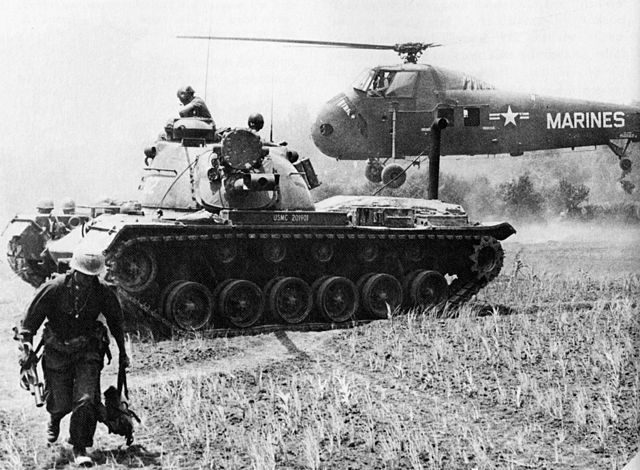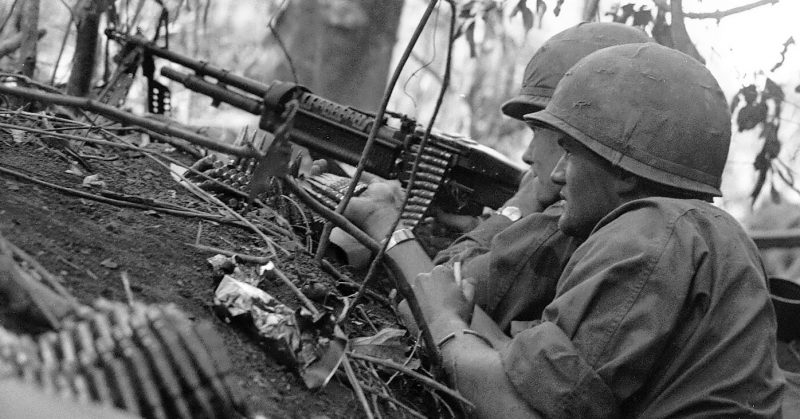How quickly life can end.
Just ask Dwaine Glathar of Fremont, Ne., who shared a cigarette and chatted with Sgt. James “Slick” Diagle in Vietnam. Fifteen minutes later Diagle was killed during an ambush by the Viet Cong.
From that and other war experiences, Glathar knows what fear smells like, but he can in no way describe it. In mid-May 1970, Glathar, a tank platoon leader, and his platoon assigned to the 2/11 Armored Cavalry, H company, was sent to Cambodia.
During the journey, they had numerous skirmishes with the enemy, destroying weapons and caches of food.
Glathar and his platoon were ambushed, which started after the lead tank was struck by a rocket-propelled grenade (RPG). The column of tanks was immobilized. Another RPG hit the tank directly in front of Glathar’s, knocking company commander, Capt. Miles Sisson, to the ground minus his leg. Tank commander Diagle was killed.
Immediately, Daigle’s friend and tank driver Richard Cunningham, jumped from the vehicle, got into the commander’s cupola and manned the machine gun. He, too, was killed when the tank was hit by another RPG.
With Sisson injured, Glathar, age 24, became the company commander.
The ambush was soon over.
Glathar’s company would go back to Vietnam. In late May or early June, his tank hit a mine. He and the other crew members were alright, but the blast blew off the track, a support roller and a road wheel.

He is humble about earning two Bronze Stars, but honored, and very touched when he remembers the day his granddaughter sat on his lap at a veterans program at her school.
Glathar will soon receive another honor on May 1 when he joins 650 Vietnam veterans from Nebraska making a day-long trip to Washington, D.C., courtesy of what is called ‘The Final Mission.’
He was born in Humboldt and graduated in 1964 as a graduate of Dawson-Verdon High School. He majored in animal science at the University of Nebraska-Lincoln and was in the Reserve Officer Training Corps (ROTC). In 1968 he graduated from UNL and received his commission in 1968.
That December he entered military service, and following additional training was assigned to the 13th Armored Battalion of the First Armored Division in the U.S. Army stationed at Fort Hood.
Being assigned to Vietnam, he had two weeks of jungle training in the Panama Canal Zone, acquiring survival skills such as surviving off the land and how to cross a river.
In what was termed the ‘Slide for Life,’ Glathar hung onto a rope that was beneath his arms and fastened to a pulley that moved him down from a cliff and over a river. He would rappel from a pylon and a 120-foot precipice with a waterfall.
You did some chores you did not think were possible, he recalls. He did not think he would jump from a 90-foot rappelling tower.
In November he flew into Bien Hoa. As a platoon leader, he led a team of five tanks with four crew members per tank. Three platoons of tanks could go on a mission. Should the company commander and the executive officer not be present, the senior platoon leader did not have to be a tank commander – he commanded the entire company.
That was not the first time he assumed command. A similar situation took place on April 9, 1970, when the Viet Cong attacked Fort Defiance, a fire support base in Vietnam close to the border with Cambodia.
Glathar was in a compound track vehicle when the attack began with the enemy on all sides. Viet Cong rockets and mortars rained down during the firefight.
He used the radio to calm the troops advising them to use their ammunition wisely, which would be replenished soon, and summoned a medivac helicopter to evacuate three or four wounded men.
He remembered a couple of things from that night: how calm he remained, relying on his training and a sound like hail hitting the vehicle, which was shrapnel. He also learned about fear.
You can smell it. There were numerous times when he was scared, but mainly, Glathar said, he was able to maintain control. The job has to be done and not dwell on fear. If you do not, panic takes over and causes problems.
After returning home he worked for Hormel Food Corp., for almost 40 years, retiring in 2005, afterward working on a part time basis for an interiors company.
Married in 1974, he and his wife had a son, Dr. Matthew Glather, a daughter and four grandchildren, Fremont Tribune reported.
Glathar does not take life for granted, not after witnessing 19- and 20-year-old soldiers being killed.
You never realize how long friendships and life will be. You have to take advantage of achieving things in life, not only for yourself, but for others as well.
